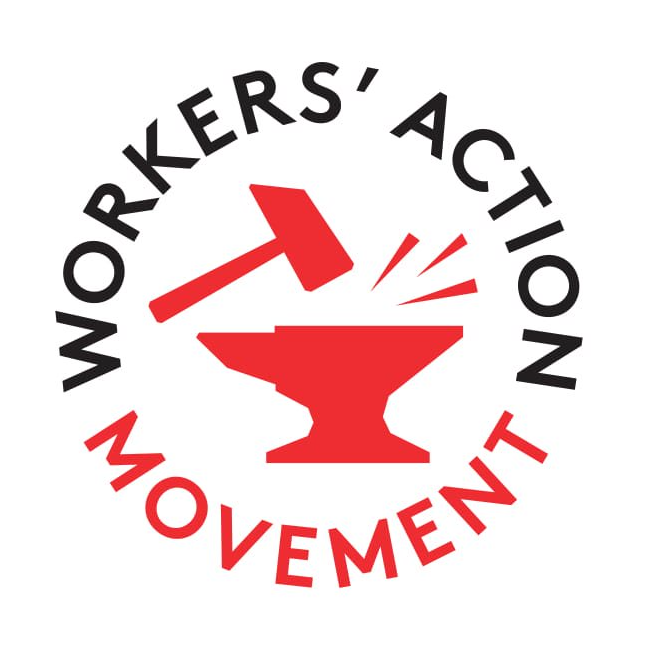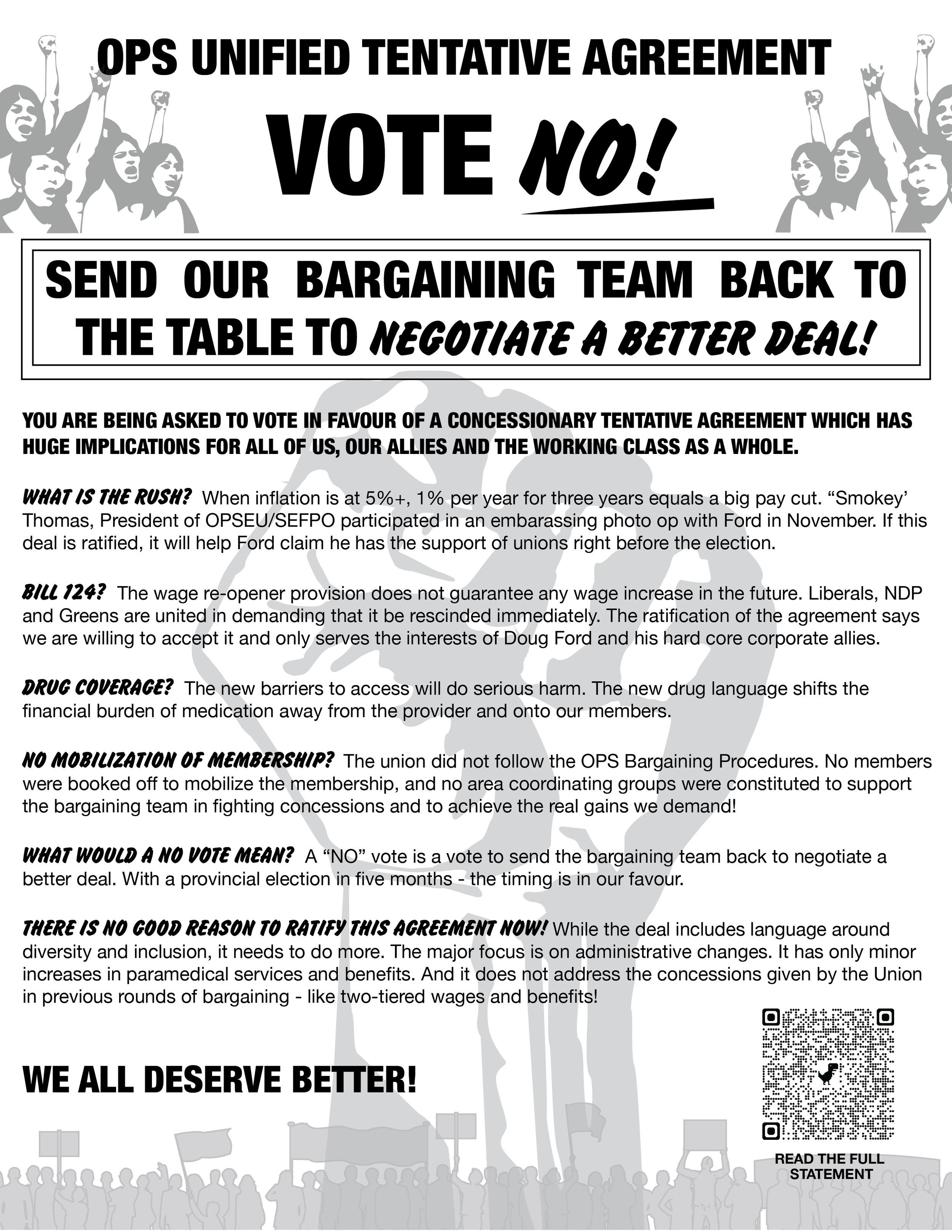OPS Unified Tentative Agreement: Vote NO! Send our bargaining team back to the table to negotiate a better deal!
Members of the OPS Unified division are being asked to ratify (vote in favour of) a concessionary tentative agreement which has huge implications for our membership, our allies and the working class as a whole.
The tentative agreement imposes a massive wage reduction. The 1% increase per year over the 3 years of the collective agreement, with inflation currently 5%+ over the past year, amounts to a big pay cut. This comes after years of below-inflation wage increases. In fact, the rationale for the 2017/18 roll-over agreement was to avoid the austerity provisions Ford was expected to impose. After bypassing bargaining then (no team was elected!), the OPS is still being asked to accept 1/1/1 now. Concerns also arise over the speed with which the agreement was made. Keep in mind that the provincial election will occur in less than 5 months. What is the rush?
There is no good reason to ratify this agreement now. While the deal includes some diversity and inclusion language, its major focus is on many administrative changes, tiny increases in paramedical services and some benefits. It does not address any of the concessions given by the Union in previous rounds of bargaining, such as acceptance of two or multi-tiered wages and benefits.
A major issue concerns the relationship between Warren “Smokey’ Thomas, President of OPSEU/SEFPO and Ontario Premier Doug Ford. Thomas participated in a news conference / photo op with Ford in November, which was a major embarrassment for OPSEU during the Ontario Federation of Labour convention. If the current deal is ratified, it will certainly help Doug Ford in his re-election campaign as he will claim he has the support of unions, including the largest public sector union in Ontario, OPSEU/SEFPO. And if Doug Ford is re-elected, where does that leave us? In his pocket?
Through years of concessions bargaining, Smokey has delivered the worst of both worlds. Smokey blew the opportunity to build a common front of public sector unions in 2018, by effectively shutting down the union for the past two years, and by quashing any discussion about how to generate a fight back.
Wages
Inflation is surging at 5%, and painfully higher in certain key commodities and services. The wage re-opener provision does not guarantee any wage increase in the future. When asked at a recent meeting to discuss what OPSEU/SEFPO would do to mobilize the membership to fight for a real wage increase, Smokey was non-committal. In fact, he personalized his attack against the questioner, an executive board member of the union. Concerning the restrictiveness of Bill 124, the Liberals, NDP and Green Party are united in demanding that it be rescinded immediately, so the ratification of the agreement only serves the interests of Doug Ford and his hard core corporate allies.
Drug Coverage
The deal also includes concessions to our drug plan. During demand setting, members put a strong emphasis on wages and increases to paramedical benefits. The employer forced concessions to allow meager gains and to make up the difference elsewhere (drug benefits). The new barriers to access will do serious harm to people with chronic and life-threatening health conditions. The new drug language shifts the financial burden of medication away from the provider and onto our members. The $300 per year account is fine for low-cost medications, but it will be used up within the first month for people requiring more expensive medications. Potentially, the insurance carrier may effectively decide the course of treatment based on the drugs they'll cover for members with chronic or life-threatening conditions.
Mobilization of Membership?
The bargaining team and union did not follow the OPS Bargaining Procedures. Specifically, there is no indication that the Provincial Coordinating Group, which is responsible for providing overall strategic direction and making decisions regarding mobilizing and member activities during negotiations, never met or made any plans, as required. No members were booked off to mobilize the membership, and no area coordinating groups were constituted. And based on the response from Smokey, there was zero intention of mobilizing the membership to support the bargaining team in fighting concessions and to achieve real gains!
What would a NO vote mean?
A vote against the tentative agreement is a vote to send the bargaining team back to the table to negotiate a better deal. As stated in section 6.7 of the OPS Bargaining Procedures “In the case of a vote to reject a tentative agreement, the union shall make it clear to members that a rejection also constitutes a strike mandate for the team”. While this has not yet been made clear by the union, you can assume that this language could be used to scare the membership into accepting the agreement. The OPS division has voted to give a strike mandate many times in the past, usually reaching support in the 90 percentile. The result would not put us automatically on strike, but would put us in a strike position, which would give power to the team to negotiate a better deal. With a provincial election in five months, and with the entire opposition in the Ontario Legislature demanding the repeal of Bill 124 now, its difficult to argue that such a result would not work in our favour. If required, the final decision to go out would then rest with the bargaining team. If we went on strike, we would have to negotiate the Emergency and Essential Services protocols prior. That would take months as this sort of agreement hasn’t been negotiated in over a decade. Delay during bargaining often works against our interests. This time it works in our favour.
Its important to note that voting down tentative offers is a normal part of contract negotiations. In the last year, workers at Kellogs, John Deere, Volvo, and at Vale mining operations in Sudbury all rejected initial offers and sent their teams back to the table -- which led to much better results.
What next?
Spread the word that the NO vote is growing! Use meetings, social media, phone calls -- every effort counts!
Urge members to vote against the deal! Participate in the Tele -Town Halls! Send the team back to the bargaining table to negotiate a better deal!
If you think that fighting against concessions bargaining and for union democracy is important, join the Workers Action Movement! Let's put the Movement back into the Labour movement.
Addendum: An analysis submitted by a concerned member.
Members please read page 58 and 59 of the MOS.
Changes are to be made to the list of eligible prescribed medications covered under the plan. This results in less coverage for much needed medication for our members.If a member is prescribed a name brand medication, only the generic brand will be covered. This clause is part of our current plan however currently the prescribing medical professional can indicate no substitutions on the prescription and the name brand is dispensed. The new clause indicates medical professionals will no longer be able to indicate “no substitutions”. If the member (patient) is not able to tolerate the medication or it is therapeutically ineffective, the medical professional will have to submit “medical evidence” to the insurance provider for consideration of eligibility. This would likely result in additional costs to the member, dependent on the medical professional.
Dispensing fees will be capped at $11.99 per prescription (currently Shoppers Drug Mart is $14.99).
There will be a cap on coverage at 5 dispensing fees, per perscription, on an annual basis.
For members taking long term medication this can be burdensome. The insurance company would like medical professionals to provide longer disbursement prescriptions (example 90 days). During the earlier months of COVID, Ontarian's were capped at 30 day refills. With a possible medicine shortage on the horizon, we may be forced to go back to a 30 day limit at anytime.
The employer will be implementing a “Manulife DrugWatch Progam” to “closely monitor and analyze the effectiveness and value of certain new drugs in comparison of existing drugs that target similar conditions or newly approved uses for existing drugs.” This program will allow the insurer to determine what medications can be used for medical conditions, denying your medical practitioner orders, possibly resulting in denials of coverage. All targeted medication must undergo a review process for approval.
The insurer will be implementing a “Specialty Drug Care Program” on a mandatory basis. This program will have a “nurse case manager” for individuals taking medications to treat complex, chronic or life-threatening conditions. This program will enable access to preferred pricing for specialty drugs.
There will now be an adjudication practice for members that use Vitamin B6 or B12 injections for various medical conditions. Coverage will be limited to treatment that is considered reasonable and customary for a patients medical condition.
Sorry for the long statement. There is just so much!
Q&A for Members
1. Shouldn't we be more appreciative of the hard work done by the bargaining team?
Choosing to accept or reject the tentative agreement has nothing to do with our appreciation for the hard work done by the bargaining team. We simply believe that they could get a better contract, and one way to support them is to signal our dissatisfaction with the terms of the deal. We respect the work done by the bargaining team, and want to make sure they feel supported when pushing for a better contract. We are making an informed choice that we believe are in the interests of the members.
2. Won't rejecting the TA mean we are pushing for a strike? I don't want that to happen.
Rejecting the tentative agreement doesn’t mean we are pushing for a strike. There are many steps that are needed before a strike can happen. Having a strike mandate does not automatically mean we will go on strike, but it will give the bargaining team power to negotiate a better deal with the employer.
3. This is the best contract we could get, wouldn't it be futile to reject it now?
Think about it: the provincial election is not even 5 months away, and the government is already on the defensive about it’s response to schools. There is a strategic value to bargaining before an election, and it’s a chance that we shouldn’t miss. If we settle now, we are giving the current government a win that they can use in their favour in the coming elections.
4. Why should we ask for a Cost-of-Living-Adjustment (COLA)? Haven’t most collective agreements stopped including that in their language?
Many Canadian labour unions still negotiate and/or have COLAs in their collective agreements (e.g. CUPW, PSAC, Power Workers’ Union, UNIFOR, just to name a few). Given that inflation is surging at 5%, a cost-of-living-adjustment is a modest way to help ensure our members can afford the necessities of life.
5. What’s wrong with the proposed drug plan? Doesn't our drug plan already make people choose generics?
If a member is prescribed a name brand medication, only the generic brand will be covered. This clause is part of our current plan. Now, the new clause indicates medical professionals will no longer be able to indicate “no substitutions”. If the member (patient) is not able to tolerate the medication or it is therapeutically ineffective, the medical professional will have to submit “medical evidence” to the insurance provider for consideration of eligibility. This would likely result in additional costs to the member, depending on the medical professional. On top of that, new dispensing fee caps will be instituted, and the Manulife DrugWatch program will allow the insurer to determine what medications can be used for medical conditions, denying your medical practitioner orders, possibly resulting in denials of coverage. All targeted medication must undergo a review process for approval.
6. If we reject the TA how can we help the bargaining team get the absolute best contract they could get?
Good question! For one, they need to know we support them in making our demands! Email UnifiedOPSBargaining@opseu.org, let them know that you will not accept concession bargaining and want to do anything you can to help get there. Help push for Open Bargaining, letting rank-and-file members be a part of the bargaining process. Let other members know what’s going on at the bargaining table, invite them to meetings with the bargaining team. Ask the bargaining team to give updates on the negotiation process and what the employer proposes. Encourage folks to attend the town hall sessions and encourage them to ask questions. Join your local and become an elected member. Participate!
7. Shouldn’t we leave the bargaining team alone and let them come to an agreement amicably?
We believe that the bargaining team needs as much help as possible, and one way to help is to show them how much members are engaged in the process. They need to know they have our support so they can push for a better deal, and reject the employer’s awful concessions.
8. What is open bargaining? Why should we do that?
The UC Berkeley Labor Center (USA) explains:
“Open Bargaining:
Bargaining in which negotiations sessions are open for all workers covered by the contract to attend. Open bargaining is not necessarily “big bargaining” because members may not automatically attend bargaining in large numbers. Open bargaining may additionally include union members from other bargaining units or members of the community.”
The Canadian independent Briarpatch Magazine says:
“Open bargaining is defined differently by the various unions that use it, but the goal is to achieve greater transparency around the hitherto secretive bargaining process. In practice, this ranges from openly publishing the union’s negotiating proposals to allowing the entire union membership to sit in on negotiations.”
The faculty members at UMass Boston explain: “Although negotiating behind closed doors is rarely questioned, the [closed] process has many drawbacks . Rank and file [members] are minimally aware of what is at stake at the bargaining table. The bargaining team is small, meaning that there are gaps in expertise. The team is also stretched thin, unable to pursue all avenues for fact-finding and outreach. And the administration does not have to confront the real power behind the union: a large, diverse, and formidable membership.
Fortunately, there is successful precedent for an alternative model of bargaining. Across the state and country, unions like ours have adopted open bargaining to combat these problems. Rank and file union members and even non-union community members are invited into the negotiating sessions to observe and testify. Members are involved in every step of the process. Open bargaining lends the union legitimacy and real power – power that we give up by continuing to bargain behind closed doors.”



